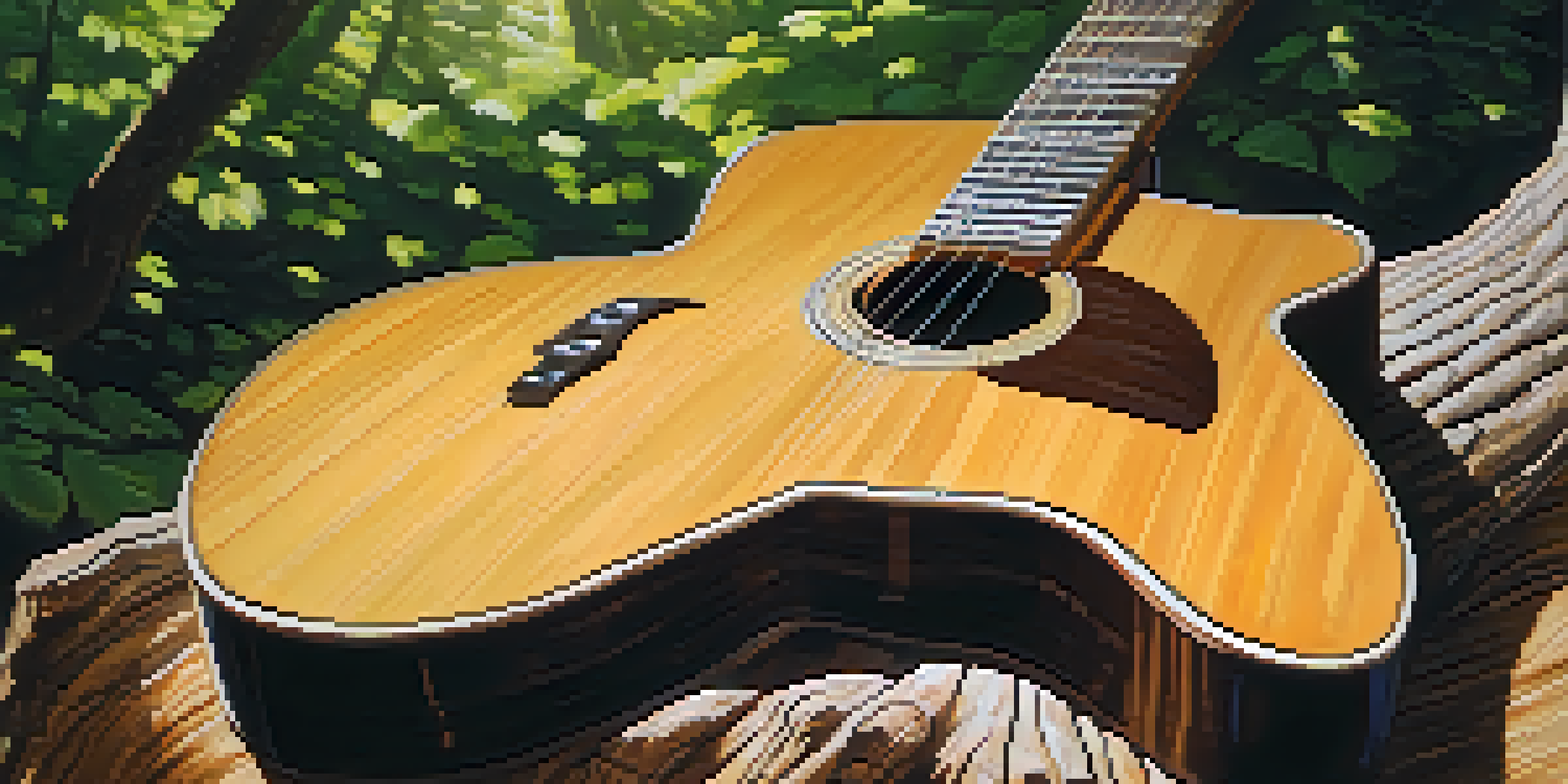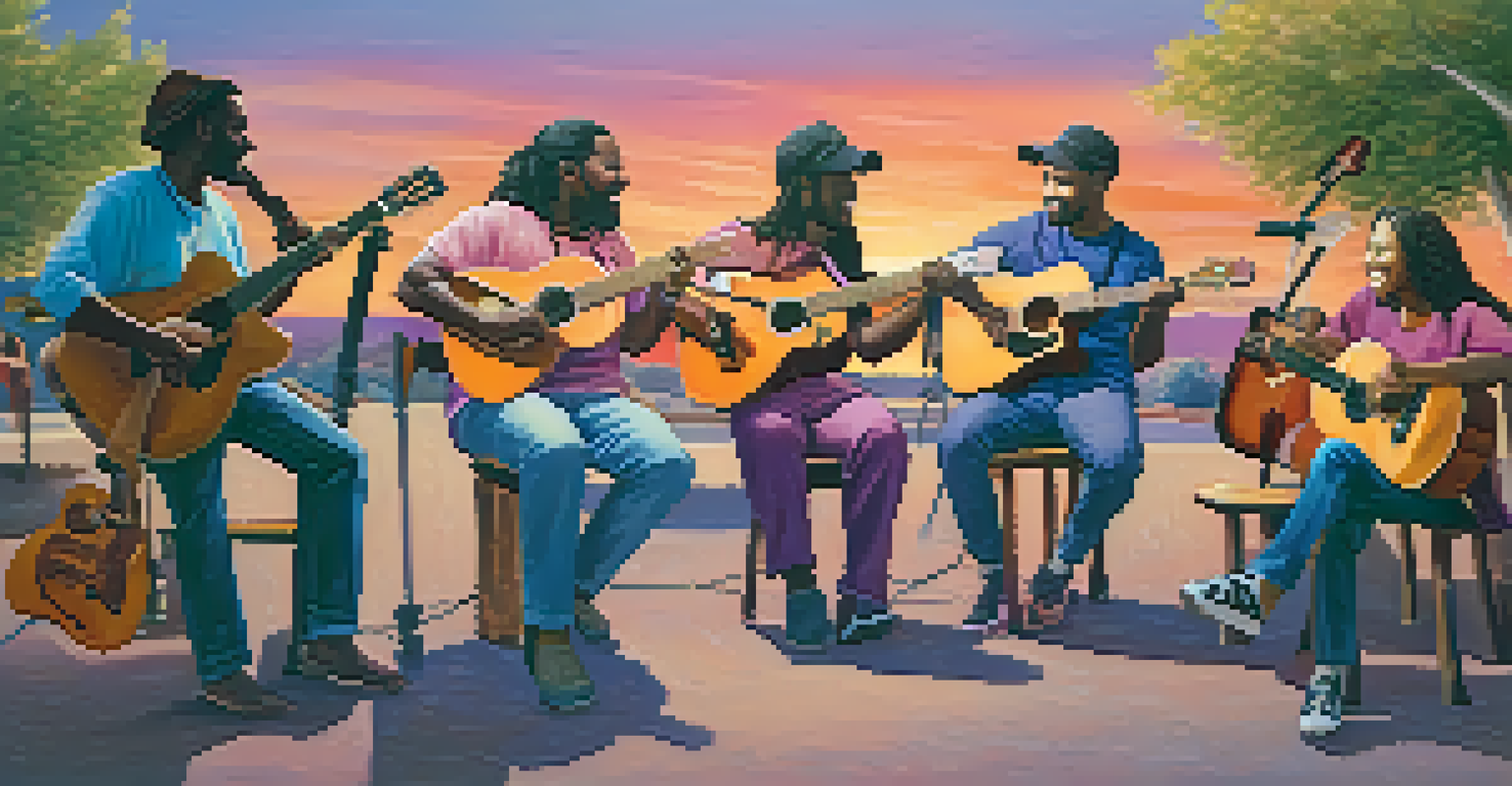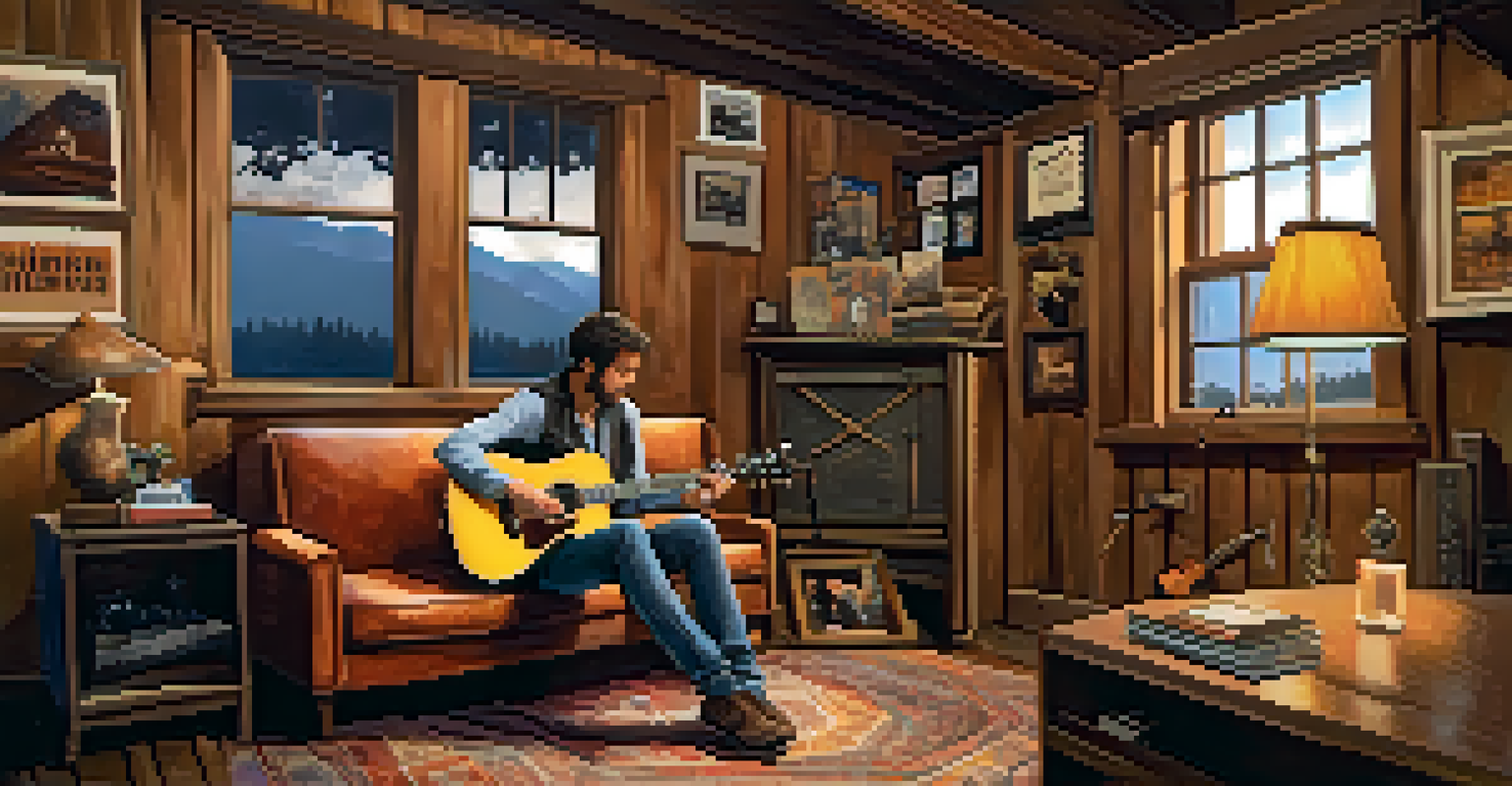The Influence of Personal Experiences on Guitar Playing

How Life Experiences Shape Musical Expression
Every strum and note on the guitar is often colored by our personal experiences. Whether it’s joy from a wedding or heartbreak from a breakup, these moments influence how we express ourselves through music. For instance, a guitarist who has faced loss may play more melancholic melodies, conveying their emotions through the instrument. This connection between life and music creates a unique sound that is both personal and relatable.
Music is the shorthand of emotion.
Moreover, the context in which we learn to play—such as our environment or the people around us—also plays a significant role. A supportive family might inspire a sense of freedom, leading to more adventurous playing styles. In contrast, a challenging upbringing could result in a more intense, passionate performance. Ultimately, our backgrounds create a musical fingerprint that is distinctly ours.
This interplay between life and music shows that guitar playing is not just about technique; it’s about telling our stories. Every riff can be a chapter, and every song can encapsulate a feeling or memory. By understanding how our experiences shape our musical expression, we can appreciate the depth of our performances and those of others.
Cultural Background and Its Influence on Guitar Style
Cultural heritage can significantly influence how we approach guitar playing. Different genres, like flamenco, blues, or rock, often reflect the cultural context from which they arose. A guitarist raised in a household that celebrates traditional music might incorporate those elements into their style, creating a blend that honors their roots while showcasing personal flair.

For example, a musician from a Latin background might infuse their playing with rhythmic patterns typical of salsa or samba. This not only enriches their sound but also serves as a tribute to their heritage. The result can be a vibrant mix that captivates audiences and tells a broader story about culture and identity.
Life Experiences Shape Music
Personal experiences, from joy to heartbreak, deeply influence how musicians express themselves through their guitar playing.
Understanding how culture shapes our guitar playing can encourage us to explore and embrace diverse influences. It allows us to experiment with blending different styles, creating a unique voice in the music community. This exploration not only enhances our skills but also fosters a deeper appreciation for the rich tapestry of musical traditions.
Emotional States and Their Effect on Guitar Performance
Our emotional state can dramatically impact how we play the guitar. When feeling joyful, we might play upbeat, energetic tunes that reflect our happiness. On the flip side, a day filled with stress or sadness could lead to more somber, reflective music. This emotional connection allows listeners to relate to our performances on a deeper level.
The guitar is a miniature orchestra in itself.
For instance, musicians often channel their feelings into improvisation. A guitarist who is feeling particularly inspired may create spontaneous melodies that express that elation. This ability to translate emotions into sound is what makes live performances so captivating and memorable.
Recognizing the influence of our emotional states on our music can also guide us in our practice. By tapping into our feelings, we can explore different genres or techniques that resonate with our current mood. This practice not only enhances our skills but also allows for personal growth through self-expression.
The Role of Life Challenges in Shaping Guitar Skills
Facing challenges in life can lead to significant growth, both personally and as a musician. Many guitarists have shared stories of how overcoming obstacles—be it health issues, financial struggles, or personal loss—has made them more resilient and expressive in their playing. These experiences often drive artists to pour their emotions into their music, resulting in more profound and impactful performances.
For instance, a guitarist who has battled with self-doubt may channel that struggle into their music, creating a rawness that resonates with many. This vulnerability can draw listeners in, allowing them to connect on a heartfelt level. It’s this authenticity that often distinguishes great musicians from the rest.
Cultural Background Influences Style
A musician's cultural heritage can significantly shape their guitar style, blending traditional elements with personal techniques.
Moreover, confronting challenges can foster creativity. Musicians might experiment with new techniques or styles as a means of coping or finding solace. This willingness to explore can lead to unexpected breakthroughs, enriching their overall playing and expanding their artistic horizons.
Guitarists’ Inspirations and Their Personal Connections
Musicians often draw inspiration from their personal lives, and this can heavily influence their guitar playing. Whether it’s a beloved artist, a pivotal life event, or even a specific location, these inspirations can shape the way we approach our craft. For instance, a guitarist inspired by a mentor may adopt similar techniques or styles that reflect that relationship.
Take the example of a guitarist who grew up listening to classic rock. Their admiration for iconic players might lead them to replicate certain riffs or songwriting techniques, blending them with their personal experiences. This fusion creates a unique sound that pays homage to their inspirations while still being distinctly their own.
Understanding these connections can deepen our appreciation for the music we hear. Every note played is often a reflection of past experiences, relationships, and inspirations. Embracing our influences can help us carve out our own musical identity while keeping the essence of those we admire.
The Journey of Self-Discovery Through Guitar Playing
Playing the guitar is often a journey of self-discovery, revealing not only our musical abilities but also our emotions and thoughts. As we learn and grow, we frequently uncover aspects of ourselves we might not have previously recognized. This process can be liberating, as it allows us to express our innermost feelings through music.
For many, the guitar becomes a tool for reflection and exploration. Whether it’s through writing songs or improvising on the spot, we often find ourselves confronting our emotions and experiences. This self-exploration can lead to personal growth, helping us understand our identities and the world around us.
Community Enriches Musical Growth
Engaging with fellow musicians fosters a sense of community, enhancing skills and providing support through shared experiences.
Moreover, the act of sharing our music with others can further enhance this journey. Performing for an audience or collaborating with fellow musicians can bring new perspectives and insights. This exchange not only enriches our sound but also deepens our connection to both ourselves and our listeners.
Building Community Through Shared Guitar Experiences
Guitar playing often fosters a sense of community, bringing together individuals who share similar experiences and passions. Whether through jam sessions, online forums, or local music groups, these interactions allow musicians to learn from one another and grow together. Sharing personal stories and musical journeys creates bonds that transcend mere notes and chords.
For example, a group of musicians might gather to play their favorite songs, each sharing their unique interpretations and backgrounds. This exchange can lead to a richer understanding of different styles and techniques, ultimately enhancing everyone’s skills. It’s a beautiful reminder that music is not just an individual pursuit; it’s a collective experience.

Being part of a community can also provide support during challenging times. Fellow musicians can offer encouragement, share resources, and inspire creativity. This camaraderie not only fuels our passion for guitar playing but also reinforces the idea that we are never alone on our musical journeys.